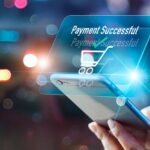What are digital payments?
A digital payment is a payment made between two parties (the payer and the payee) where funds are transferred electronically from the payer’s bank account to the payee’s bank account. No hard cash is exchanged between the two parties in a digital payment. Common examples of digital payments are payments made with credit or debit cards, mobile wallets, bank transfers, contactless cards, QR code payments, etc.
A payer and a payee could either be a business or a person. Usually, at least one (or, both) parties need to be online in order to complete a payment.
What do you need to make a digital payment?
For a digital payment to happen:
- Both the payer and payee must have bank accounts.
- They must use an online banking method, such as a card, a mobile wallet, a bank transfer, and such.
- A payee must use a device, such as a PC, smartphone, or tablet to make the payment. A merchant would need a payment gateway, card reader, NFC-enabled device, or QR codes to accept a payment.
- And finally, they must be registered with a bank or a payment service provider.
Are digital payments secure?
Digital payments are highly secure, though not full-proof. We still hear about online payment fraud and its rise along with the boom in e-commerce, but that’s another story. Digital payments offer a quick, easy, and secure way for people to shop for products or services, both online as well at a physical store.
Read more: How to Secure Your Payments in 2023
Why digital payments?
Convenience, speed, and security. As e-commerce explodes, and internet penetration grows, more people are opting for digital payments because of the way they make payments simpler. Compared to a decade ago, more people are using these payments. Today, people are paying not just with cash or cards, but also with apps on their mobile devices. Whether it be shopping for daily essentials or sending money to friends and family, or buying online. A Mastercard study from 2020 found that seven out of ten consumers believe digital payments will replace cash, and half of them already plan to avoid cash altogether.
Digital payments have surged in Europe. Recent reports from Statista indicate that digital payments will amount to €1,751.23 billion by the end of 2023, driven by the boom in e-commerce.
Read more: How are Consumers in Europe Paying?
How do digital payments work?
The digital payment ecosystem involves multiple parties that work together to enable a seamless and successful payment. The chain involves the payer (who pays the money), the payee (who receives the money), their banks, and a payment network.
In an e-commerce retail setup, this means a consumer is the payer and the merchant is the payee. The consumer’s bank (also called the issuing bank) deducts the money for a purchase from their bank account after verification, and passes it to the merchant’s bank (also called the acquiring bank), who the credits the money into the merchant’s bank account.
Other intermediaries in this process include the payment service provider (who processes the payment), and the payment network (Visa, Mastercard for cards, a banking network such as SEPA or SWIFT for bank transfers). To transact digitally, both the payer and payee must have bank accounts and use online banking methods (cards, e-wallets, bank transfer, etc.).
Learn more: Acquiring Bank vs Issuing Bank: Know the Difference
What are the Benefits of digital payments?
There are several advantages to using digital payments, such as:
- Faster: Digital payments are often quicker, thus reducing waiting time at checkout and creating shorter queues. This, in turn, boosts the customer experience, both online as well as in-store, leading to higher sales.
- Safer: Digital payments are secure because they use technology such as payment tokenization, encryption, multi-factor authentication, and more.
- Costs lesser: Digital payments cost a merchant less than paper-based methods. They are also easier and quicker to account for, leave a clear trail that makes accounting easier, and simplify operations and compliance.
- Increases sales: Digital payments generate valuable data, which helps merchants to analyze shopper behaviour and link them to loyalty and reward programs to drive sales. For example, methods like credit cards or the more-recent Buy Now Pay Later, offer consumers access to credit so that they can complete a purchase even if they are short on funds. Thus, in such cases, offering these payments allows a merchant to make a sale, which would otherwise not have been possible.
How can Novalnet Help?
We can help you set up digital payments quickly so that your business can succeed in a digital-first world. As trusted advisors to Europe’s leading brands, we help them to process payments smoothly and securely. Our technology helps you to accept payments globally in 125+ currencies in 150+ automated country-specific payment methods. Plus, our AI-based risk management solutions and advanced analytics solutions help you design the best payment experiences for your customers, all in a fully secure PCI DSS-certified environment.
Reach out to us today to know more about how we can help.
Jose Augustine is the Chief Business Development Officer at Novalnet with extensive experience in European payment industry and a knowledge powerhouse.












